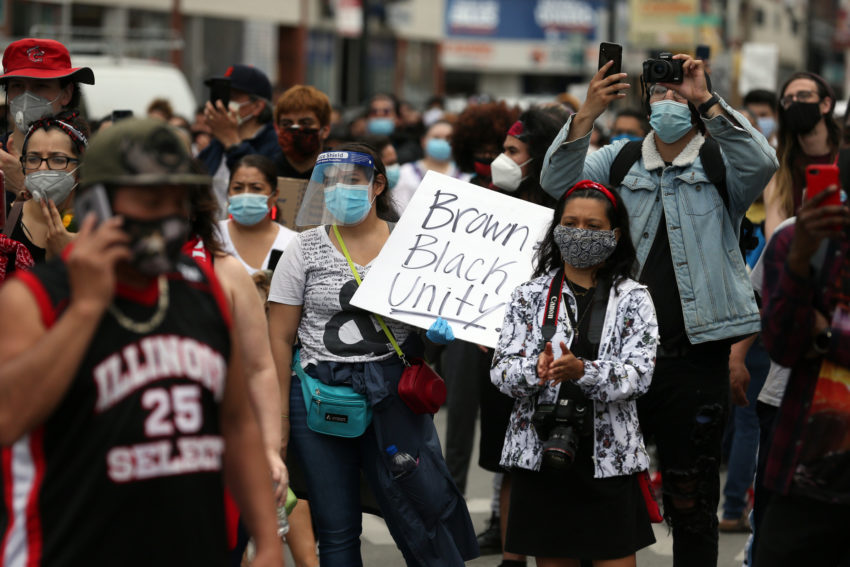
Share On Social!
On April 30, protesters, many with guns and without face masks, entered Michigan’s state capitol to resist stay-home orders amid coronavirus, resist mask-wearing, and demand businesses reopen.
“Infectious disease physicians and public health officials publicly condemned these actions and privately mourned the widening rift between leaders in science and a subset of the communities that they serve,” reads an open letter signed by 1,288 public health professionals, infectious disease professionals, and community stakeholders across the country.
Then, when George Floyd was killed by a police officer May 25, protesters, many unarmed and wearing face masks, took to the streets to promote racial justice.
This time, public health professionals responded differently.
The noted support for mask-wearing and social distancing to the extent possible in police brutality protests, but “do not condemn these gatherings as risky for COVID-19 transmission.”
“We support them as vital to the national public health and to the threatened health specifically of Black people in the United States. We can show that support by facilitating safest protesting practices without detracting from demonstrators’ ability to gather and demand change,” according to the letter. “This should not be confused with a permissive stance on all gatherings, particularly protests against stay-home orders. Those actions not only oppose public health interventions, but are also rooted in white nationalism and run contrary to respect for Black lives.”
Racism is a Public Health Threat
Long-standing systems of oppression and bias are embedded in policies and practices that have created health living conditions for some and unhealthy living conditions for others.
Conditions include:
- Employment opportunities
- Affordability and quality of housing
- Safety and reliability of transportation networks
- Access to healthy food
- Economic mobility and ability to accrue wealth
- Public safety and overpolicing
- Access to and quality of health systems and services
- Safety and inclusiveness of physical and social environments
- Presence of environmental toxins
- Stress due to adversity
Unjust conditions are responsible for disparities in health among Latinos, Blacks, and other people of color. This includes COVID-19, which is disproportionately impacting Latinos.
Public Health Recommendations amid Protests Against Systemic Racism
These racial injustices are what sparked the letter from health professionals, including representatives from Johns Hopkins, Emory, Drexel, and universities in Texas, California, Florida, and across the country.
“White supremacy is a lethal public health issue that predates and contributes to COVID-19,” the letter states.
Together, the writers suggest the following guidance:
- Support local and state governments in upholding the right to protest and allow protesters to gather.
- Do not disband protests under the guise of maintaining public health for COVID-19 restrictions.
- Advocate that protesters not be arrested or held in confined spaces, including jails or police vans, which are some of the highest-risk areas for COVID-19 transmission.
- Oppose any use of tear gas, smoke, or other respiratory irritants, which could increase risk for COVID-19 by making the respiratory tract more susceptible to infection, exacerbating existing inflammation, and inducing coughing.
- Demand that law enforcement officials also respect infection prevention recommendations by maintaining distance from protesters and wearing masks.
- Reject messaging that face coverings are motivated by concealment and instead celebrate face coverings as protective of the public’s health in the context of COVID-19.
- Prepare for an increased number of infections in the days following a protest. Provide increased access to testing and care for people in the affected communities, especially when they or their family members put themselves at risk by attending protests.
- Support the health of protesters by encouraging the following:
- Use of face coverings.
- Distance of at least 6 feet between protesters, where possible.
- Demonstrating consistently alongside close contacts and moving together as a group, rather than extensively intermingling with multiple groups.
- Staying at home when sick and using other platforms to oppose racism for high-risk individuals, and those unable or uncomfortable to attend in person.
- Encourage allies who may wish to facilitate safe demonstrations through the following:
- Providing masks, hand-washing stations, or hand sanitizer to demonstrators.
- Providing eye protection, such as face shields or goggles, for protection against COVID-19 and chemical irritants used to disperse crowds.
- Bringing wrapped, single-serving food or beverages to sustain people protesting.
- Providing chalk markings or other designations to encourage appropriate distancing between protesters.
- Supplying ropes, which can be knotted at 6-foot intervals, to allow people to march together while maintaining spacing.
- Donating to bail funds for protesters.
- Listen, and prioritize the needs of Black people as expressed by Black voices.
“Protests against systemic racism, which fosters the disproportionate burden of COVID-19 on Black communities and also perpetuates police violence, must be supported,” the letter states.
What Can You Do?
Urge city officials, public health leaders, and social justice organizations in your community to push for these strategies.
In San Antonio, for example, one group of public health advocates is drafting a letter to the mayor urging the city adopt these strategies.They are even including the opposition of crowd-control weapons—including rubber and wooden bullets—which are lethal at close range and inaccurate at longer distances.
You can find your public health department contact information here. Find your local government information here.
We also invite you to learn more about how implicit bias, moral disengagement, and system justification impact Latinos and other people of color!
Take Action: Get Your City to Declare Racism a Public Health Crisis!
Racism is a public health crisis.
In fact, decades of racism-infused social, economic, and political systems have led to inequitable communities that are disproportionately burdened by stress, disease, and premature death.
Amid protests for racial/ethnic justice, U.S. city leaders are creating city resolutions to declare racism a public health crisis and commit to specific actions, as a first step toward lasting and meaningful change.
Download the free Salud America! “Get Your City to Declare Racism a Public Health Crisis” Action Pack to get input from local advocates of color, start a conversation with local leaders, and build local support for a resolution to declare racism a public health issue along with a commitment to take action to change policies and practices.
The Action Pack was created by Dr. Amelie G. Ramirez, director of the Salud America! Latino health equity program at UT Health San Antonio, with input from several San Antonio-area social justice advocates.
By The Numbers
3
Big Excuses
people use to justify discriminatory behavior



